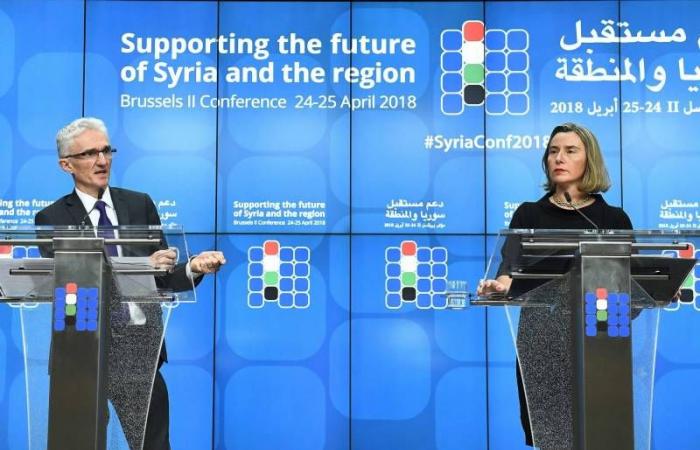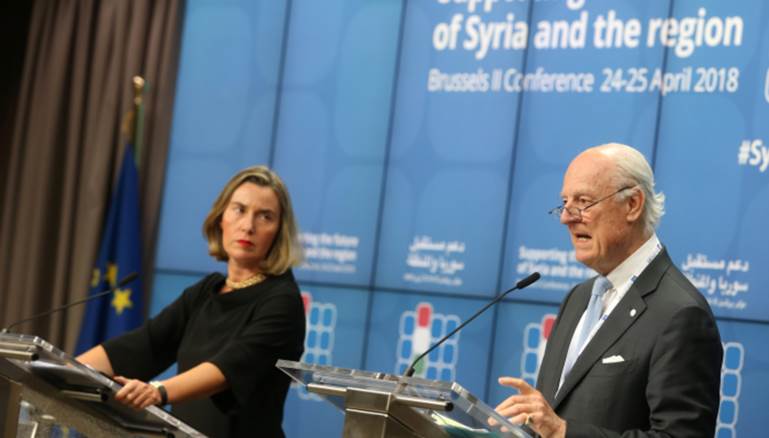Highlights of Syrian Civil Society Participation in the Brussels II Conference, April 2018

Renas Sino
It seems that the Brussels Conference held in April 2018,[i] not only offered a platform to gather together Syrians of different backgrounds and political affiliations, but also contributed to accentuating the substantial differences and discords among them along each of their positions on the Syrian issue. Anybody with common sense would desire an element of societal accountability from all those involved in public affairs, including civil society representatives. This accountability takes many forms in many countries, and Syria is not an exception.
At the conference, the focus on accountability was expressed in many different ways:
1. Accountability extended to all civil society organizations, not just the ones who participated in the Brussels Conference, as the civil society movement as a whole was called into question by some.
2. The understanding of accountability deviated from its original positive and constructive aim of responsibility to a means of exacting revenge. Instead of working to address systemic issues, many civil society organizations as well as individuals involved in public affairs sought to settle scores with each other.
3. The exercise of accountability has strayed from its original purpose of transparency. As a result, civil society had begun to be blamed for the whole of the Syrian issue, forgetting the role that multiple parties have played in committing atrocities in Syria—first and foremost among which is the Syrian military.
4. Accountability became a tool to criticize the working mechanism of the Civil Society Support Room (CCSR) of the UN facilitated peace negotiations. The CCSR is a mechanism to support Syrian civil society input into the peace process. The CSSR is already endlessly criticized, beginning with the selection mechanisms as well as the control practiced by of the Office of Special Envoy Mr. De Mistura and a group of Syrians.
5. Those civil society organizations who were held “accountable” for their participation in the conference did not accept the criticism leveled against them, despite the fact that there were several complaints regarding the content of the statement produced by them,[ii] which was intended to inform civil action in Syria.
The discussions regarding accountability, and the resulting accusations and fragmentation of the conference’s message are related to the structure of Syrian civil society. Civil society in Syria has never been neutral and has clear political positions, either toward the Syrian government or other parties. This is quite understandable, given the complexities of the Syrian political situation. However, what is incomprehensible and unacceptable is the lack of impartiality by Syrian civil society towards society itself. For example, many organizations have remained indifferent toward the situation for civilians in Afrin, which illustrates civil society’s loss of its moral compass that is supposed to be rooted in human rights.

In a political sense, Syrian civil society is divided between pro- and anti-Assad camps. This converted the conference into a negotiating platform, pulling it away from human rights where consensus rather than values have been pursued. The split among Syrian civil society organizations and the lack of sufficient time at the conference to address the issues at hand made the subsequent “Statement by Syrian Civil Society in Brussels – April 2018,” produced from the conference sound like a political declaration rather than a statement based on human rights principles, thus costing it the humanitarian civic spirit and potential as a guiding compass for human rights on the Syrian issue.
Since the Brussels Conference took a negotiating approach rather than a collaborative one, it is unsurprising that there were points gained and lost. Thus, we need to address each point in the statement in order to a reach a meaningful conclusion:
1. The political solution, according to the Geneva process and United Nations Security Council Resolution 2254 (2015), called for the rejection of all forms of violence, particularly the use of weapons of mass destruction. This is the best solution to the Syrian issue. However, Syrians in general, and the opposition in particular, consider it to be quite an unattainable political aspiration.
2. The forced demographic changes taking place across Syria, before and after the revolution, have become a pressing issue. Unfortunately, this issue is being addressed as a political one, not a national one that is the concern of all Syrians, and therefore is subject to the whims of the victor.
3. There is no such thing as non-reprisal and non-politicized transitional justice, there is only transitional justice. In order for the process to be successful, it should not be politicized, and should be governed by national courts, if available.
4. It is unreasonable that the issue of disclosing the fate of detainees and abductees is not considered a primary demand in the Syrian negotiations.
5. Although the statement did not request the lifting of sanctions, it did issue a negative review of them. The criticism focused on the impact of the sanctions on the education and health sectors as well as personal livelihoods. This all remains a sensitive issue, due to the fact that economic sanctions are relevant to a political solution, and one of the few available tools left to exert pressure on the Assad regime's allies. Undoubtedly, if we were to ask the Syrians living in the Assad regime-held areas about their positions on sanctions, the vast majority would support eliminating them, simply because of their disastrous effect on the lives of the civilian population. Unfortunately for Syrians, this desire is shared by the Assad regime. Any change in regard to economic sanctions must be accompanied by progress in the political process.
6. The Syrian opposition has failed to provide services for necessary legal documents for Syrians. As such, the Assad regime maintained its legal legitimacy by issuing legal documents such as passports. It should be noted that most Syrians in neighboring countries are opponents of Assad that have been displaced from their country. If the Syrians in those countries want to remove the legitimacy of Syrian consulates they have to boycott them and refuse to pay bribes in order to gain extensions on their passports. Syrians should be careful not to practice false virtue as the statement demanded improvement of services provided to Syrians.
7. The safe and voluntary return of Syrian refugees, in accordance with the 1951 Refugee Convention is an absolute necessity. I do not believe that rational and sensible people, whether pro- or anti-Assad, would reject such a demand.
8. A supportive working environment for civil society organizations from a legal and legislative point of view must be ensured. It is an understandable demand, especially after the difficulties faced by organizations in neighboring countries.
9. Human rights violations committed by the Assad regime should have been clearly and unequivocally condemned in the statement, therefore, it was an understandable observation made by those who criticized the statement’s content, due to the simple fact that the Assad regime has been committing acts of immeasurable barbarism against its opponents. However, there must be no turning a blind eye to the abuses committed by other parties in the conflict.

In conclusion, the conference achieved its objectives, as the statement constitutes the most substantial agreement ever reached between the two conflicting sides of pro- and anti-Assad. The statement, in short, was beneficial for all Syrians, irrespective of their affiliations. Unfortunately, our interests and the needs of our diverse communities intersect with the dominant military and political parties.
The conference succeeded in mobilizing humanitarian aid to Syrians inside of Syria and in neighboring countries. This support was achieved through pledges totaling $4.4 billion (€3.5 billion) for 2018, dedicated to improving their situation and preventing their access to Europe.
Additionally, the EU continues to use sanctions to exert pressure for political transition. The EU affirms that there is no solution in Syria outside of the Geneva process and the United Nations resolutions, especially UN Security Council Resolution 2254. In addition, the EU confirmed the role of civil society organizations in the political transition, which provoked the military as well as politicians, who are both losing their power as a result of their unending failures.
In any case, what we have to regret is the loss of leadership; even though the conference was held on behalf of the Syrians, they were being led by international organizations. We also regret the opportunities lost since 2013, as well as the negative and destructive reality that is daily becoming part of our culture.
What we should feel remorseful about is our silence over repeated violations for short-term political goals.
In the end, I can only wonder who we refer to when we say “Syrians.” Are they a particular group? Are they still there?
[i] The Second Brussels Conference on "Supporting the Future of Syria and the Region" took place April 24-25, 2018. It was hosted by the European Union and co-chaired by the United Nations with over 57 countries, 10 regional organizations and 19 UN agencies participating. The conference sought to mobilize humanitarian aid for Syria as well as build political support for the UN-led peace process. Syrian Civil Society Organizations (CSOs) from across Syria (including Syrian government and opposition areas) and neighboring countries participated in a closed-door side event undertaken by the EU and the UN Office for the Special Envoy for Syria, to discuss the future of Syria and a peaceful solution to the conflict.
[ii] The ‘Statement by Syrian Civil Society in Brussels – April 2018’ was issued and presented at the closing session of the Brussels II Conference as the agreed upon formula in the name of Syrian civil society.



